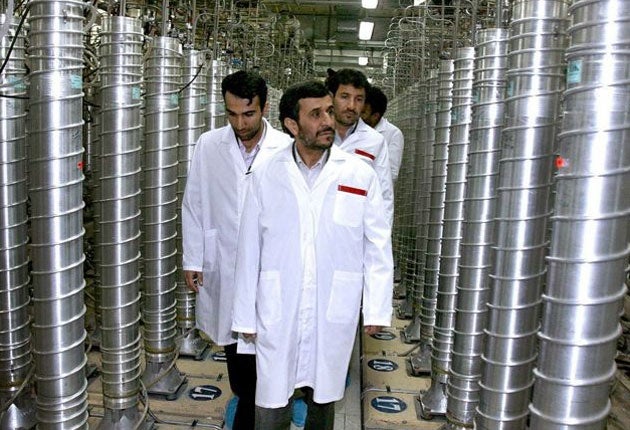Sworn enemies across the disarmament table
Iran and Israel 'questioned each other' at nuclear conference

Bitter enemies Iran and Israel, whose normal discourse is that of threat and counter-threat, engaged in a rare face-to-face exchange of views at a nuclear disarmament conference in Cairo, Israeli media reported yesterday.
Tehran vigorously denied the reported contact, but Israeli officials confirmed that representatives from both countries had questioned one another at a conference last month, organised by the International Commission on Nuclear Non-proliferation and Disarmament.
Iran's delegate used the opportunity to ask the Israeli representative whether the Jewish state had nuclear weapons. This enquiry met with a smile but no answer, according to a report in yesterday's Haaretz. Israel is widely believed to possess nuclear arms, though always refuses to confirm or deny it.
A spokeswoman for the Israeli nuclear agency said senior official Meirav Zafary-Odiz had taken questions after her speech from a variety of participants, including Ali Ashghar Soltaniya, Iran's ambassador to the UN nuclear watchdog. He in turn took questions from her after his own speech. That is rare as the Iranians normally avoid any interaction, even indirect, with Israeli officials at international conferences.
However, the Israeli spokeswommand was clear to stress: "there was no meeting, no informal discussion and no handshake".
Iran, whose President Mahmoud Ahmadinejad considers Israel an illegitimate state established on territory stolen from Palestinians, was quick to deny any contact whatsoever. "The reports in this regard are sheer lies and there has been no meeting in Cairo," a spokesman for the Iranian atomic organisation was quoted as saying by state television.
Delegates from Saudi Arabia, Russia, China, India, the US, France and Britain attended the conference. According to Haaretz, Ms Zafary-Odiz told the meeting that Israel is in principle willing to discuss regional disarmament, but first wants to see a strengthening of regional security and to sign more peace treaties with Arab states. Mr Soltaniya reportedly said during his remarks that Iran has no enmity towards Jews, only towards Zionists.
Galia Golan, a political scientist at the Interdisciplinary Centre in Herzliya, near Tel Aviv, said that if exchanges had actually taken place between the delegates, it was "extremely important".
"It's very important to begin some kind of dialogue to start undoing the dehumanisation," she said.
Such encounters might serve to lower tensions between Israel and Iran, which have been raised by bellicose rhetoric. President Ahmadinejad has threatened to wipe Israel out and Israeli Prime Minister Benjamin Netanyahu has said "all options are on the table" including military strikes if Tehran develops nuclear weapons.
News of the direct dialogue at the nuclear conference came as Tehran decides whether to sign up to a deal drafted by the International Atomic Energy Agency after talks in Vienna this week which would see Iran ship its uranium to France and Russia to be turned into fuel rods for a nuclear medicine facility.
Iran has been given until today to reach a verdict on the proposal, but comments from a senior Iranian lawmaker yesterday cast doubt on a positive response from Tehran. "They [the West] tell us: you give us your 3.5 per cent enriched uranium and we will give you the fuel for the reactor. It is not acceptable to us," said parliament's deputy speaker Mohammad Reza Bahonar.
Join our commenting forum
Join thought-provoking conversations, follow other Independent readers and see their replies
Comments
Bookmark popover
Removed from bookmarks